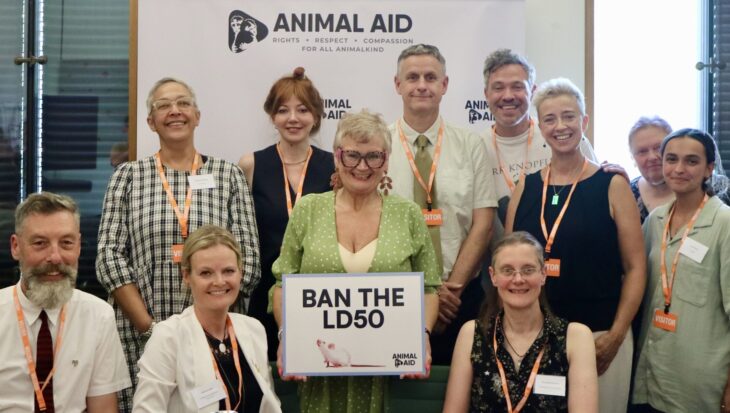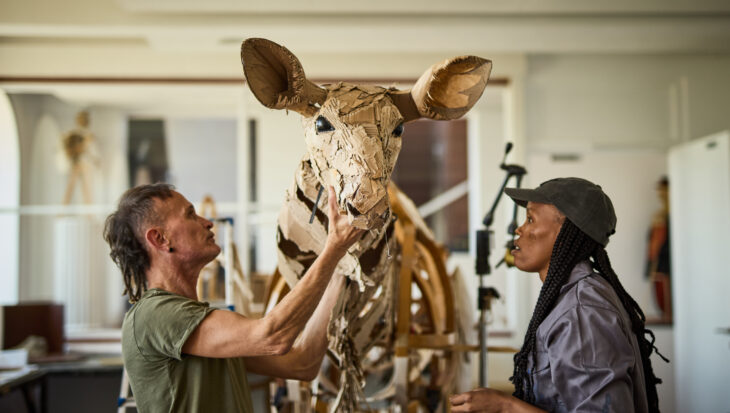Animal Aid in parliament to discuss ending animal tests
Yesterday, Animal Aid hosted a roundtable in Westminster, to meet with MPs and other invited guests to discuss the ending the LD50 and other animal tests.
Posted 02 Jul 2025

Posted on the 3rd September 2008
National campaign group Animal Aid today (September 3) calls on government to crack down on drug industry practices that put profits before all else.
In a major new report, entitled Making a Killing: How drug company greed harms people and animals, the group exposes a catalogue of unethical practices – beginning with misleading animal tests – that are designed to drive up drug sales, which already cost the NHS £11 billion per year. The public’s health also suffers: in 2006, 1 million people were hospitalised in Britain due to adverse drug reactions.
Citing more than 400 references, the report paints a compelling picture of a morally bankrupt industry that has run out of control. Dishonest and unethical practices include: employing unreliable animal tests to make drug products look safe; suppressing negative clinical trial results; manipulating doctors with handsome consultancy fees; and exploiting people’s health fears through advertising campaigns that pose as ’disease awareness’ initiatives.
Some 600,000 animals pay with their lives each year for such self-serving behaviour. But because the data generated by animal ‘safety’ and ‘efficacy’ tests cannot be applied reliably to human medicine, patients also suffer. The Home Office has admitted that, though it is the animal research licensing authority, it has never ‘commissioned or evaluated any formal research on the efficacy of animal experiments’.
People also pay a heavy price because of pharmaceutical company behaviour during the trialling and marketing of drugs. A stark example is Avastin, about which there was recently heated debate over whether the NHS should prescribe it for kidney cancer patients; it costs up to six times as much as existing treatments. Avastin was originally licensed to treat colon cancer but was also used by opthalmologists – in such small quantities that it was extremely cost-effective – as a therapy for wet age-related macular degeneration. Instead of applying for a licence for this use, the drug’s manufacturer packaged it in tiny quantities, renamed it Lucentis, and now reportedly sells it for up to 100 times more than the cost of Avastin.
Animal Aid believes that ‘Big Pharma’ must be reined in so that it serves the public as well as itself. The group is calling on the British and European governments urgently to introduce a series of measures (see Notes below). These include commissioning an independent scientific review into the reliability of animal tests; enforcing a fairer pricing system for drugs; shelving EU plans to allow drugs promotion direct to the public; and ensuring that drug companies do not conceal vital testing data from the National Institute for Health and Clinical Excellence (NICE).
Says the report’s author, Toni Vernelli:
‘Animal Aid’s new report has brought together compelling evidence that pharmaceutical industry greed kills not only hundreds of thousands of laboratory animals in Britain every year, but it also places at serious risk the health of the general public. A million people were hospitalised in Britain in 2006 because of drug side effects, yet politicians, the regulatory authorities and key sectors of the media have failed to hold this rapacious and reckless industry to account. NICE has recently taken a hammering because it sought to control a runaway drugs bill. It should, instead, be awarded additional powers. The government must rein in this wayward industry before the NHS is bankrupted and public health suffers even more grievously.’
The five measures being demanded of the British and European governments are:
Yesterday, Animal Aid hosted a roundtable in Westminster, to meet with MPs and other invited guests to discuss the ending the LD50 and other animal tests.
Posted 02 Jul 2025

Have you heard? A breathtaking arts initiative, ‘The Herds’ will be arriving in London this Friday.
Posted 27 Jun 2025
